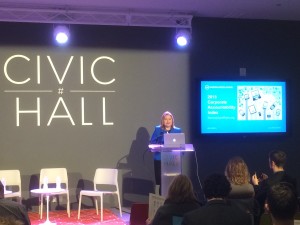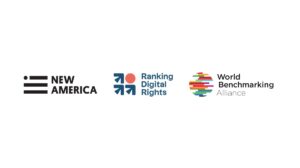At Tuesday’s launch event for the Ranking Digital Rights Corporate Accountability Index, project director Rebecca MacKinnon presented the Index’s findings and joined a panel discussion with Peter Micek, global policy and legal counsel at Access Now, and Ellery Biddle, director of Global Voices Advocacy. Moderating the discussion was Micah Sifry, co-founder and executive director of Civic Hall.

Rebecca MacKinnon presents the findings of the inaugural Corporate Accountability Index. Click the image to view a webcast of the event, courtesy of Joly MacFie and the Internet Society. Image: Priya Kumar
“The top-scoring company is only 65 percent. So if this were a test, they’d be getting a D in school.” MacKinnon said, “But…this is a diagnostic test; this is not a certification. This is a test you take at the start of the class to figure out where everybody stands, and then we can all get to work and figure out how we can all improve.”
By evaluating the extent to which companies are being open and clear about their policies and processes that affect users’ freedom of expression and privacy, the Corporate Accountability Index serves as a starting point for conversations about how to foster an Internet that is compatible with human rights.
What’s at stake here? Biddle described how the Global Voices community, which includes writers and bloggers from around the world, established a project focused on online free expression after realizing how government and corporate actions were threatening their work.
“Our blogs started being blocked. People started receiving different kinds of threats because of what they were writing online. Legal measures were taken against them,” Biddle said of Global Voices contributors. “So this [Index] speaks to a lot of issues that we’ve dealt with quite personally.”
People around the world rely on communications networks and platforms for far more than work. “Increasingly, our daily lives are forced online,” Micek said. “Our rights are mediated by these platforms, and our access to human rights depend[s] on their policies and on the decisions made, often far, far away.”
Last month, Micek’s organization, Access Now, received reports that access to mobile Internet and SMS had been shut down in Congo-Brazzaville around the time of a mass demonstration to oppose a proposal to extend presidential term limits. This was the fifteenth reported shutdown Access Now identified this year, Micek said. Such actions are dangerous, Micek explained, because they prevent users from telling each other, “Hey, don’t go down that street, the troops are assembled here; protest elsewhere.”
And yet, companies hardly disclose information about the types of demands they receive to shut down access to networks, which makes it nearly impossible for users to understand when or why the networks upon which they depend may be inaccessible. This example highlights the importance of corporate disclosure in ensuring that digital technologies and platforms align with human rights.
The panelists highlighted several steps companies can take to improve their respect for users’ free expression and privacy. These include:
- Explain how they handle private requests to restrict content or obtain user data.
- Disclose more information about how they determine whether to remove content that other users have flagged.
- Implement encryption measures that keep user data private.
In addition, NGOs, activists, and researchers can use the Index data and methodology to dig deeper, for example, by ranking additional companies within a particular country or by comparing how the actions of the companies ranked in the Index compare with their commitments and disclosures.
Companies are only one actor within the digital ecosystem, but they play a critical role in ensuring that the use of digital tools doesn’t mean giving up on human rights. This Index of companies was published just one week after Freedom House released the Freedom on the Net Index, which found that Internet freedom around the world has declined for the fifth straight year in a row.
“We’re at this crossroads right now,” MacKinnon said. “Companies can be part of the problem…or at least some critical mass of them can be part of the solution…They need to be part of the solution. And they’re going to have to think creatively and innovatively. These are some of the most innovative companies on Earth. Let’s get to work with some innovation here.”
A webcast of the event is available here. Many thanks to Joly MacFie and the Internet Society for running and sponsoring the webcast.




